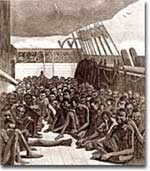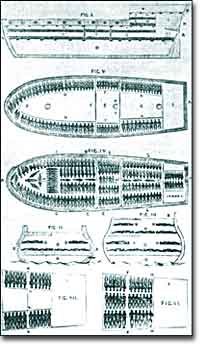
6. African Americans in the British New World

This engraving from an 1860 issue of Harper's Weekly magazine shows the tightly packed conditions of a slave ship. Many Africans died during the grueling middle passage — so many that the ship depicted above was considered safer than most, having only lost 90 of 600 passengers.
Even before the Mayflower touched ground off Cape Cod, African Americans were living in British North America. Although slavery itself was not foreign to West Africans, the brutal nature of the trans-Atlantic slave trade and the nature of colonial slavery was without parallel in African history. Millions of people deemed savages by their new "masters" were uprooted from their ways of life and forced to adopt new ones.
Europeans and even some Africans would participate in the slave trade that brought millions of Africans to the New World. African slave traders would ruthlessly bring their captives from the interior of the continent where they would await the business transaction that would take them thousands of miles from their homeland.

Slave ships were packed full of captured Africans to ensure maximum profits for the ones selling the slaves at auction. This diagram of the slave ship Brookes dates from 1788 and shows the close quarters of the slave trade.
Slaves bound for the North American British colonies overcame tremendous odds to reach their destinations. The dreaded "Middle Passage" often claimed half or more of its human cargo. Most of the survivors lived harsh lives as plantation slaves. Some lived in the towns and learned trades and some lived as domestic slaves, particularly in the North. Often overlooked are free African Americans, who managed to escape or were lucky enough to be granted their freedom.
Yet as the seventeenth century became the eighteenth century, the institution grew. Harsh codes were adopted across the South, and although slavery was less common in the North, many New England shippers profited from the so-called triangular trade. Slavery was indeed becoming entrenched in British colonial life.
The colonization of the Americas brought together for the first time three distinctive peoples from three distant continents. The Native Americans, Europeans, and Africans that inhabited what would become the United States of America each previously had glorious civilizations and would contribute to a new glorious civilization that would follow. Despite the great numbers of Africans — now African Americans — in bondage, a rich legacy of artistic, religious, and linguistic gifts merge with the realities of a New World to form the foundations of what would become American culture.





